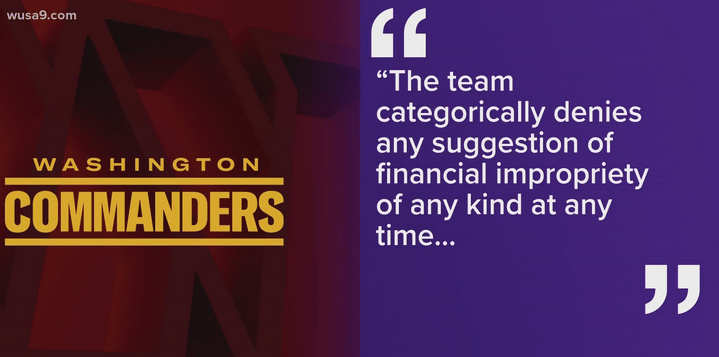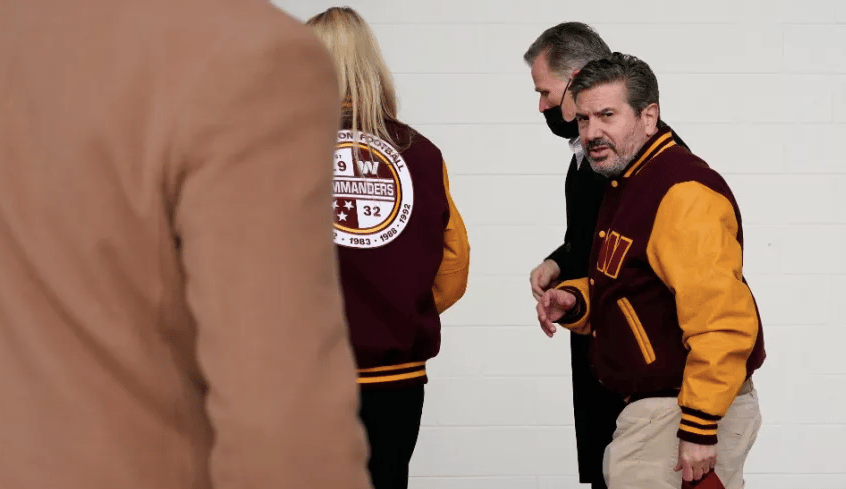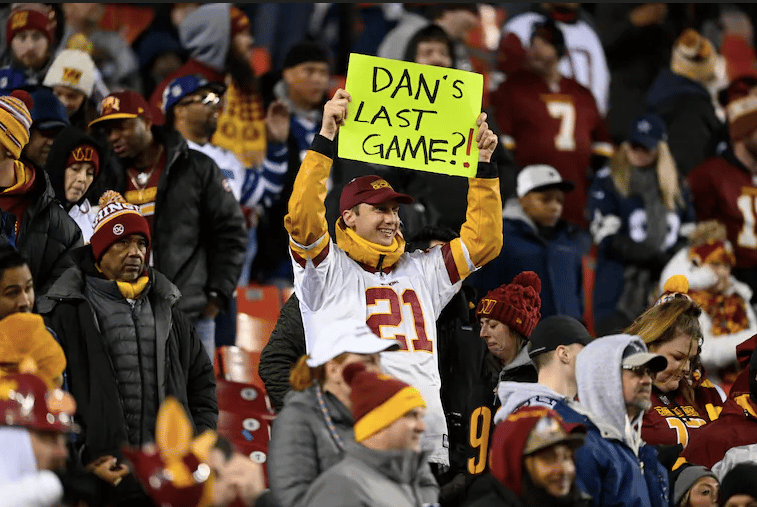The Washington Commanders, a local NFL team from Washington, have always been a source of pride and a symbol of the D.C. area. Yet, in 2020, the club faced a serious scandal that negatively affected its reputation and eroded fans' trust for years to come.
As it would be revealed in a series of exposé by Washington Post, under Daniel Snyder's 21-year ownership the organization has fostered a culture where women felt being marginalized and exploited. The climate in the organization permitted abusive conduct without accountability. Twenty five women — many of whom requested anonymity due to NDAs or concerns about retaliation — reported experiences of sexual harassment while employed by the team.
In this newsletter’s first issue, we'll discuss the nature of the crisis and communication strategies used by the club that instead of salivating the wound added more fuel to the fire. You will see how the Commanders with Dan Snyder at the helm attempted to control the narrative and the NFL's role in shaping the investigation.
The Commander(-s) Under Siege
It all began in July 16, 2020, when the Washington Post (“WP”) published an article detailing ingrained culture of sexual harassment within the Washington Redskins (later rebranded to Commanders) club. The allegations raised by the first disclosed victims “span most of Snyder’s tenure as owner and fall into two categories: unwelcome overtures or comments of a sexual nature, and exhortations to wear revealing clothing and flirt with clients to close sales deals”. Different personnel had been involved starting from usual staffers to vice-presidents, long-standing broadcasters and the owner himself.
Dan Snyder publicly played the ignorance, feigning he didn't have any idea of the past incidents. On July 17, 2020, he said, "Beth Wilkinson and her firm are empowered to do a full, unbiased investigation and make any and all requisite recommendations." The NFL corroborated Snyder's position and backed the team's attempt to investigate the allegations.
In the meantime, on August 7, 2020 Dan Snyder sued WP over allegedly baseless stories. WP being WP doubled down and on 20 August, 2020 published a second story revealing new allegations of sexual misconduct directly implicating Snyder.
Specifically, one story referred to the production of the official video "Beauties on the Beach" for the Washington’s 2008 cheerleader swimsuit calendar. The original video (aired on TV/internet) shows cheerleaders enjoying the sun and praising their custom bikinis, all while a photographer captures them from different angles and strategically conceal nudity. However, unknown to the cheerleaders, a second, unofficial video was created from the same shoot, intended for “executive team’s” viewing. This 10-minute clip included unintended moments of nudity as the women adjusted their poses. A former staff member Brad Baker claims that the video was produced for Daniel Snyder.
The NFL responded to public concerns by taking over the Wilkinson investigation, with her staff now reporting directly to NFL Commissioner Roger Goodell. But behind the scenes, a different plan was in motion. Instead of being a bystander, Snyder was at the center of an effort to manage the story and save himself.

The victims interviewed by Washington Post: Megan Imbert, Tiffany Bacon Scourby, Alicia Klein, Shannon Slate and Rachel Engleson. Photos by Toni L. Sandys/The Washington Post; Jesse Ditmar, Erich Schlegel and Nathan Morgan for The Washington Post.
How Dan Snyder Attempted to Control the Narrative
Dan Snyder attempted to interfere with the Beth Wilkinson investigation in numerous ways [2]:
Private Settlement with the NFL: Snyder and the NFL reached a private agreement in November 2020, allowing him to prevent the release of any information produced during the investigation, including Wilkinson's findings. It directly contradicted to their public statements that promised transparency and an unbiased investigation.
Shadow Investigation: Snyder conducted a "shadow investigation" to discredit accusers and journalists in an attempt to shift the blame away from himself. Information he gleaned from that investigation was used to compile dossiers he delivered to the NFL and Wilkinson team to assure them he was not the source of the toxic culture. Snyder continued sending private investigators even after the NFL took over the case. The NFL knew about this but did nothing to prevent it.
Abusive Litigation: He used abusive litigation to obtain information about potential witnesses and persuade them to terminate their participation in the process. This involved filing a defamation suit in India and using this as a Trojan horse (via discovery proceedings in seven US states) to get documents related to the Washington Post and the Wilkinson investigation.
Snyder also attempted to use a former general counsel as an intermediary to threaten enforcement of the confidentiality terms of a previous settlement with some of the witnesses.
Offering Financial Settlements: Snyder made financial settlements with former employees in exchange for their silence about the investigation. This included giving extra money to former employees who had previously settled with him but required updated NDAs as a condition of the ongoing settlements. He specifically attempted to pay off a witness who had accused him of sexual assault a large sum to discourage her from speaking to Wilkinson.
Blaming Others: Snyder constantly sought to shift the blame for the toxic workplace culture to others, most notably former team president Bruce Allen. He claimed that Allen was responsible for the "damned good culture" and brought up Allen's inappropriate emails in an effort to back up his claims.
At about the same time, he filed an affidavit alleging that the negative press coverage was part of an extortion campaign initiated by the minority shareholders of the club who made their request for arbitration. The minority owners wanted to sell their shares due to the increasing public pressure in the media and possible financial ramifications.
On November 23, 2020, Snyder sat down for a rare interview with the Wall Street Journal. The piece painted him as a progressive owner who had made a dramatic turnaround to improve the culture of the Commanders, and claimed that none of the staff members accused of improper behavior still worked for the organization.
Limiting Wilkinson's Access: Snyder and his crisis team actively worked to delay/deny Wilkinson access to important information.
Examples of issues include:
Publicly, the team had said employees would be released from their non-disclosure agreements in order to cooperate with the investigation. However, Snyder took steps to ensure at least one important witness did not speak to Wilkinson by failing to release her from the NDA.
Snyder tried to use legal mechanisms to block Wilkinson's team to access documents related to the 2009 sexual assault complaint against him. As part of that effort, he used a former general counsel as a go-between in filing suit against Wilkinson and seeking to prevent her from disclosing sensitive information.
One can see in Snyder's actions a motive to control the narrative, narrow down the grounds of the investigation, and, finally, protect his own interests. These steps, however, brought some fruits, as in February 2021 cheerleaders reached a settlement with the Washington football team. The terms of this settlement were not disclosed by either party.

Roger Goodell says in 2021 that Daniel Snyder ‘didn’t interfere with the work that our investigator did’. Photo credit: Steve Luciano / AP
Surprise-surprise: the NFL sticks with Dan Snyder
On March 1, 2021, despite a request from Wilkinson for Snyder to sell his shares or be suspended, the NFL approved Snyder's purchase of the remaining shares in the team from its minority shareholders, giving him 100% ownership.
But it didn't end there. The NFL went on to [1]:
(i) Signing a Secret Agreement: Within days of taking over, in July 2021, the NFL signed a Common Interest Agreement with the Commanders, functionally granting Snyder veto power over the release of any info from the investigation. This directly undermined public trust and contradicted promises of an unbiased investigation. No individuals were named.
(ii) Tolerating Interference: The NFL was aware Snyder was attempting to interfere with the investigation in several ways, including witness intimidation through private investigators and lawsuits. But, again, the NFL took no action against Snyder. Indeed, an NFL high-ranking employee admitted that Snyder violated NFL policy. Yet, the NFL merely stated that none of the offenders still worked for the organization. In doing so the NFL used the same exact arguments (a choice of words) as Snyder in the Wall Street Journal interview (November, 2020).
(iii) Burying the Findings: Initially, the NFL had engaged Wilkinson to produce a written report of her findings. However, Commissioner Goodell later decided to receive only an oral briefing, claiming this would better protect witness identity. The NFL then released only a vague press release summarizing the investigation's findings, refusing to provide any details or the report itself.
The decision was a “U-turn“ of how the NFL handled the 2014 Miami Dolphins bullying scandal, in which a detailed 144-page report was released to the public.
(iv) Cutting a deal with Snyder: Emboldened by the NFL's collusion, Snyder continued to tighten his grip on the narrative. He would negotiate favorable terms of how the investigation would conclude - he managed to get the team fined $10 million instead of him personally. Snyder, on his own accord, removed himself from the daily functions of the team; his wife, Tanya, would assume those duties. He even negotiated the wording of the NFL statement dated July 1, 2021.
While the NFL seemed to take over the investigation, it was actually working with Snyder to help control the narrative and limit his culpability. The lack of transparency from the league and its willingness to negotiate with Snyder only added to the impression that it was more interested in protecting the NFL's brand than in uncovering the truth. This is nothing new here though. In the mid-2000s the NFL also tried to hide the data related to the growing number of serious concussion cases among the NFL players.
The NFL’s statement in July 2021 presented the results of the investigation in a carefully crafted manner to make them appear less disturbing. The way the NFL and the Washington Commanders handled the situation undermined trust and increased scrutiny from all parties concerned: fans, media, and other stakeholders.
Never bet against Americans: A New Wave of Accusations
However, in October 2021 the Wall Street Journal and the New York Times published articles revealing previously undisclosed allegations against Snyder. On February 22, 2022 Tiffani Johnston, a former Commanders employee, publicly accused Snyder of sexual harassment during a House Oversight Committee round-table (see video below).
He denied the accusations, calling them “outright lies."
Fearing the coming of a new crisis, NFL said it would conduct an independent investigation into new accusations against Snyder by former USA Attorney Mary Jo White from Debevoise & Plimpton LLP. In June 2022 Commissioner Goodell testified before the House Oversight Committee and reiterated that Snyder had been held responsible and was no longer involved in the daily functions of the team. That claim was contradicted by on-the-record public reporting showing that Snyder had actually returned to his regular daily duties. Then, Snyder also gave sworn testimony to the House Oversight Committee, denying all charges against him.
Washington Commanders’ corporate communication strategy
In essence, the club's response to the allegations of sexual harassment and unwanted sexual advances expressed by Tiffani Johnston was as follows:
(i) The Commanders representatives continued to deny any financial impropriety while trying to minimize the severity of the workplace culture problems.
(ii) Dan Snyder focused on denying personal knowledge of a toxic workplace, claiming he was "unaware of these allegations until they surfaced in the media" because he was "too hands-off as an owner." He also denied Johnston's claim that he made a specific unwanted advance towards her, stating that she "never [brought] any of these allegations to management's attention." That statement directly contradicted Johnston's recollection and the supporting documents
(iii) While the Commanders have acknowledged a problematic workplace culture, they have sought to characterize it as a problem of the past, now resolved by changes in leadership and staff. Yet, witnesses and evidence in the case showed that the pattern of behaviour had repeated itself over decades.

Photo source: wusa9.com
The Key Findings of New Investigation
The report of Debevoise & Plimpton LLP, dated July 20, 2023, and filed after the investigation had concluded, highlighted [3] that:
(i) Tiffani Johnston's allegations have been substantiated. The investigation revealed that, indeed, Dan Snyder acted inappropriately while in a work-related dinner where he had:
rested his hand on her thigh under the table without asking.
pushed her to walk over to his car, after dinner, and tried to talk her into getting in with him without her consent.
(ii) Investigators found Johnston's account credible and it was supported by other witnesses and evidence.
Financial Improprieties. The investigation also substantiated the allegations that the Commanders knowingly concealed and withheld NFL revenues in direct violation of league rules.
Specifically,
Intentional underreporting of shareable NFL revenues, primarily accomplished by misclassifying NFL revenues as non-shareable income from special events.
About $11 million in revenue was improperly concealed from distribution, including $1.09 million that the Commanders expressly admitted to.
Another $44.49 million of ticket, parking, license and other revenues was transferred from a shareable NFL account to non-shareable special event accounts, thus deserving more scrutiny.
While the investigation confirmed the presence of these financial improprieties, it could not ascertain the total amount of the underreported revenue or Snyder's personal involvement. Some of this confusion can be attributed to the Commanders' lack of full cooperation in providing the requested documentation. The report nonetheless seems to suggest that Snyder was well aware of efforts to artificially lower the revenue sharing pool and created an environment that encouraged employees to enhance the financial status of the club.
Lack of Cooperation. The report includes scathing criticism of Dan Snyder and the Washington Commanders for insufficient cooperation with the investigation:
Snyder first refused to sit for an interview for almost a year, then set a one-hour limit. The interview he gave produced little substantive information;
The Commanders delayed producing key documents, were selective about the materials they released and never provided the evidence necessary to evaluate the financial claims against the organization;
The Commanders also denied investigators' request to interview their independent auditors;
This obstructive conduct extended the investigation and impeded a thorough understanding of the club’s financial misconduct, including Dan Snyder's involvement in the matter.

Dan Snyder had to sell the team and part ways with the organization after a prolonged crisis. Photo credit: AP Photo/Patrick Semansky
Negative Consequences for Dan Snyder & Washington Commanders
Once the Debevoise & Plimpton LLP published its report, the following events unfolded:
Financial Penalties: Dan Snyder was fined $60 million by the NFL. The fine was part of the NFL's disciplinary actions against Snyder, who faced allegations of creating a toxic work environment.
The news came on the same day Snyder's sale of the Washington Commanders to a group led by Josh Harris for $6.05 billion was officially approved. The move marked the end of Snyder's 24-year ownership, during which he was often criticized both for his management style and the performance on the field.
Reputation Damage: The findings of the investigation hurt Snyder's reputation and legacy. He was branded a "comprehensive failure" as an owner of a team.
Impact on the Franchise: With new ownership, the Commanders' organization will likely look quite different as it tries to repair its public image and improve operational standards. Snyder's exit is being seen as a chance at a clean slate after years of not being a well-operated franchise in many ways.
What could have been done better: Reflections on Anti-crisis management
In retrospect, it is clear that with a thoughtful communication plan along with good faith, much of the negative publicity and damage to the brand could have been averted. Where there is a will, there is indeed a way; but sadly, there was no will. Let’s go into some more detailed suggestions here.
Initial Response (July 2020):
(i) It is essential to acknowledge the severity of the allegations and to express concern for those affected. This approach demonstrates empathy and a commitment to addressing the issue at hand. The acknowledgment should have been articulated clearly and unequivocally instead of denials of knowledge, as was observed in the initial stages of the crisis.
(ii) It is important that a truly independent investigation to be initiated by a reputable third party to find the truth without unnecessary delays. Moreover, it should be stressed that the investigator is fully autonomous and has access to all relevant information.
(iii) The organization should opt out for full transparency and cooperation with the investigation to demonstrate credibility to the public. The pledge to transparency cannot be illusory. Snyder's execution of the common interest agreement with the NFL in efforts to control the flow of information directly contradicted that commitment.
(iv) Proactively interact with key stakeholders:
Employees should conduct town hall meetings to listen to concerns, provide support resources, and emphasize a zero-tolerance policy in regard to harassment.
The organization apologizes sincerely and outlines the steps being taken in order to create a safe and inclusive environment.
Media should be responsive to inquiries, provide factual updates, and refrain from speculation or defensiveness.
Proactively contact sponsors and important stakeholders (preferably by C-level executives) and address their concerns to reassure that the team is on the right track from now on.

Fan’s reacting to the scandal. Photo credit: John McDonnell/The Washington Pos
During the Investigation (2020-21):
(i) There should be complete cooperation with the investigator in terms of access to documents and witnesses. The organization must avoid any actions that can contribute to the perception of interference or manipulation.
(ii) Provide regular updates on the progress of the investigation, including steps taken to address the concerns and implement recommendations by the Wilkinson’s team as well.
Focus on action and actual change, rather than deflection of blame or engaging in legal battles, which might be perceived as an effort to “shut down” the claimants (victims, other stakeholders acting in the interests of the victims).
Post-Investigation (2022-23):
(i) All the findings from the investigation should be released to the public. The NFL took over the investigation, but Snyder could have used this opportunity to call for the release of a written report, even outside of the agreement. That would have been true leadership on the part of Dan Snyder or any other executive.
(ii) There is a need for firm action in line with the findings of the investigation, including accountability of persons irrespective of their level within the organization. Showing very serious commitment to changing the toxic environment and making up for past mistakes is very important. In addition, the negotiated settlement and general non-application of specific consequences for those involved have given an air that Snyder or other personnel were not being genuinely held accountable.
(iii) Formulate a concrete action plan to reform workplace culture in line with diversity, equity, and inclusion principles; impart extensive training programs, set clear reporting mechanisms, and make sure that there is regular follow-up to provide a safe and respectful work environment.
Conclusion:
The way Snyder handled the scandal did not come close to what is considered the best practices of effective communication during a crisis. Non-disclosure, manipulation of the narrative, and court cases filed against accusers only give the impression of defensiveness and intention to shift blame. This only increased scrutiny and extended the crisis.
The Commanders' saga is an apt case in point to what may occur when the all-important intrinsic values of transparency, making amends, and accountability give way to self-preservation. It is a good case study about how a potentially strong institution that was facing a crisis of its own making decided to finesse and silence rather than engage with truth-telling and commit to substantive measures toward reform. The NFL's involvement in this process raises very serious questions about the league's commitment to safeguarding its employees and conducting a fair and impartial investigatory process.
In contrast, there are many examples in which a leadership team took effective anticrisis measures. In this context, the Dallas Mavericks case is a good example of how an independent investigation should be conducted and its findings and recommendations made public.
Resources:
All facts, quotes and references have been derived mostly from the following set of documents:
How the NFL and the Washington Commanders Covered Up Decades of Sexual Misconduct, Report by Committee on Oversight and Reform U.S.House of Representatives (December 8, 2022) (Link)
Case of District of Columbia (Plaintiff) vs. PRO-FOOTBALL INC d/b/a WASHINGTON COMMANDERS, DANIEL SNYDER , THE NATIONAL FOOTBALL LEAGUE, ROGER GOODELL (Link)
Report of Findings of the Investigation Regarding Daniel Snyder and the Washington Commanders by Debevoise & Plimpton LLP (July 20, 2023 ) (Link)
House Oversight Committee Examining the Washington Football Team’s Toxic Workplace Culture (Video)
House Oversight Committee hearing on toxic workplace culture (Video)


